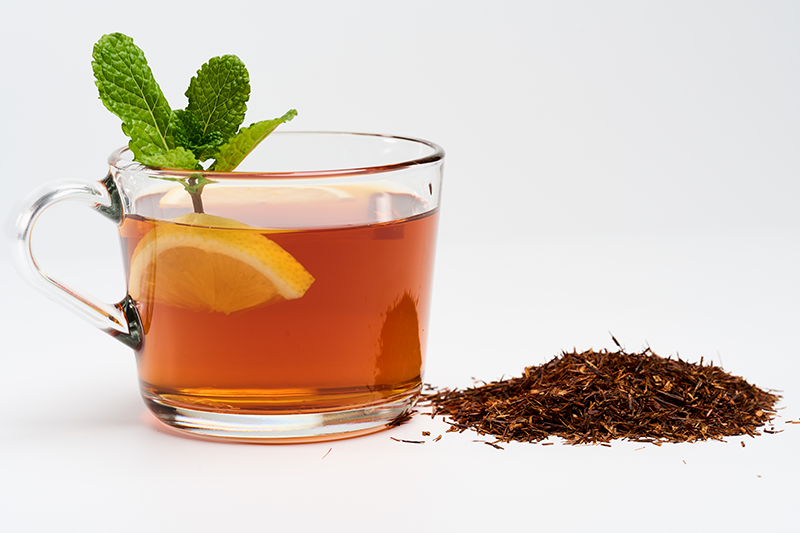What is Rooibos?
Rooibos, pronounced “ROY-boss,” is a caffeine-free herbal tea native to South Africa. Derived from the Aspalathus linearis plant, it is often referred to as “red bush” tea due to its reddish hue after fermentation. Rooibos grows exclusively in the Cederberg region, a mountainous area with a unique climate and soil that supports this remarkable plant. Unlike green or black teas, which are made from the Camellia sinensis plant, Rooibos is naturally free of caffeine and low in tannins, making it a soothing alternative for those sensitive to traditional teas or coffee.
Rooibos tea is available in two primary varieties: traditional red Rooibos, which undergoes fermentation to develop its characteristic red color and sweet, nutty flavor, and green Rooibos, which skips fermentation for a lighter, grassier taste. Both types are packed with antioxidants and nutrients that contribute to their rising popularity in the health and wellness community.
Historical Uses of Rooibos
The history of Rooibos is deeply rooted in South African culture. Indigenous Khoisan people were the first to recognize its benefits, using the leaves to make herbal remedies for a variety of ailments, including digestive discomfort and skin irritations. These traditional uses were passed down through generations, long before Rooibos gained international recognition.
In the late 18th century, European settlers in South Africa began to adopt Rooibos as an alternative to expensive imported black tea. The plant’s adaptability to the local environment made it an accessible and affordable beverage. By the 20th century, Rooibos became a commercially viable crop thanks to the pioneering efforts of Benjamin Ginsberg, a Russian immigrant who helped formalize its cultivation and export.
Today, Rooibos is celebrated globally not only for its unique flavor but also for its cultural heritage and health benefits, which are still being studied and understood.
What Forms Does Rooibos Come In?
Rooibos is incredibly versatile and comes in a variety of forms to suit different tastes and uses. The most common form is loose-leaf tea or tea bags, which can be steeped in hot water for a refreshing drink. Red Rooibos is slightly sweet and earthy, while green Rooibos offers a more delicate, herbal flavor. Both can be enjoyed plain or enhanced with milk, honey, lemon, or spices.
For those seeking convenience, Rooibos is also available in pre-made bottled teas, instant powders, and concentrated extracts. These are ideal for iced teas, lattes, and smoothies. Rooibos has even found its way into skincare products, supplements, and culinary applications. Its mild flavor makes it an excellent ingredient in baked goods, marinades, and desserts, adding a subtle sweetness and a boost of antioxidants.
Rooibos Benefits and Uses
Rooibos is celebrated for its rich antioxidant profile, which includes aspalathin and nothofagin, compounds known for their ability to combat oxidative stress. These antioxidants may help protect cells from damage, reduce inflammation, and support overall health. Studies suggest that regular consumption of Rooibos can contribute to improved heart health by lowering blood pressure and reducing LDL cholesterol levels.
Additionally, Rooibos is gentle on the digestive system, making it a popular choice for soothing stomach discomfort. Its anti-inflammatory properties have also been linked to better skin health. When applied topically, Rooibos can help alleviate eczema, acne, and sunburn.
Rooibos’s caffeine-free nature makes it an ideal relaxing drink, especially before bedtime. It can also serve as a flavorful hydration option for children and pregnant individuals who may need to limit caffeine intake. Some proponents even use Rooibos as a natural remedy for colic in infants.
Who Should Not Take Rooibos?
While Rooibos is generally safe for most people, certain individuals should exercise caution. Those with specific allergies to plants in the Fabaceae family may experience reactions to Rooibos. Additionally, some studies suggest that high consumption of Rooibos extracts might interfere with certain medications due to its antioxidant properties. If you are taking medications that rely on oxidative pathways, consult your healthcare provider before incorporating large amounts of Rooibos into your diet.
Pregnant or breastfeeding individuals should also consult a doctor before using Rooibos in medicinal amounts, even though it is widely considered safe as a regular beverage. People with kidney or liver conditions should also be cautious, as there is limited research on how Rooibos might affect these organs in sensitive cases.
Caffeine Free, Earthy & Delicious
Rooibos tea, a unique herbal infusion from South Africa, offers a range of health benefits. Its naturally caffeine-free nature and low tannin content make it a versatile choice for tea lovers seeking a gentle and flavorful alternative. With a rich history dating back to indigenous Khoisan traditions, Rooibos has evolved into a global phenomenon, available in various forms such as loose tea, extracts, and even skincare products. Whether you enjoy it hot, iced, or as part of a recipe, Rooibos is a delightful way to incorporate antioxidants and relaxation into your daily routine. Its earthy flavor and numerous applications ensure it remains a favorite for generations to come.
NOW Foods Better Off Red Rooibos Tea – 24 Tea Bags, Non GMO, Organic
Rooibos Leaf Tea Bags, Caffeine Free, 24 Tea Bags, Alvita Teas


Use Coupon Code: FREE
*Sorry, coupons can't be combined.